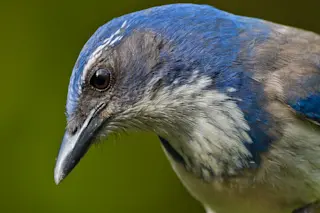Nicky Clayton is no better at sitting still than are the birds she studies. Back in the 1990s, her colleagues at the University of California, Davis, would stay at their computers at lunchtime, but she would wander outside and watch as western scrub-jays stole bits of students’ meals and secretively cached the food. During these informal field studies, Clayton, an experimental psychologist, noticed that the birds returned frequently to their stashes and changed their hiding places.
“I thought, ‘This is odd,’ ” she says. “I assumed birds would cache for a long time—days or months. But this was for minutes.” She theorized that the birds were moving their caches to avoid pilfering. When food was plentiful, they grabbed as much as possible and hid it, then hid it again when they could do so without being observed by potential thieves. That behavior implied that the scrub-jays might be thinking about ...















